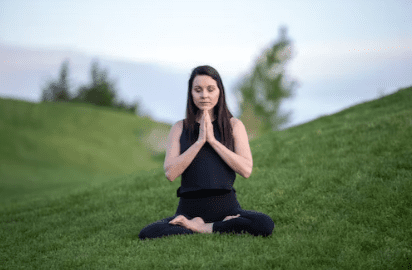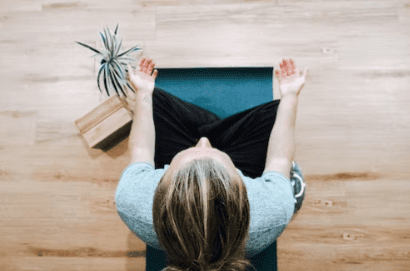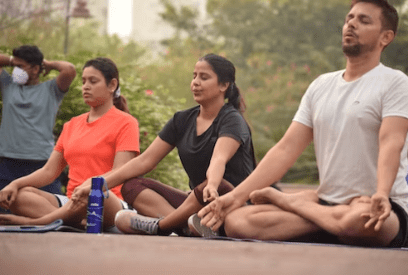What is Meditation? How to Use It to Achieve Your Goals
Learn about the power of meditation and how to use it in your life for your goals and success.

Selfpause Affirmation App
Download the app to get 1,000’s of affirmation meditations and everything you need to write, record and listen to your own.
Meditation is a practice that is used for many purposes. It can help you clear your mind and relax. This article will provide you with information about how to practice meditation. You will learn about the benefits of meditation, the different types of meditation, and tools for meditating.
Practicing meditation

Research shows that practicing meditation can boost our overall well-being and immune system. It also improves our self-confidence, increases empathy, increases kindness, and decreases stress. It also enhances our mood, increases our ability to focus, and improves our concentration. Meditation can improve our immune system, and reduce the chances of contrating diseases.
Meditation can give you amazing insights. In fact, it can make you aware of the most profound things in life. A common term used to describe this state is acala vipashayana, which means insight devoid of mental activity. The aim of meditation is to experience this kind of insight. Here are some tips to help you achieve it:
The first step in practicing meditation is to find a quiet place. Ideally, you should meditate for between two and five minutes each day. As you get better at it, you can increase the duration. Many people find it hard to meditate in the middle of the day, so it’s important to make it a daily habit to sit down and meditate in the morning. When you begin your meditation, try to focus only on your breathing. Try to avoid distractions such as TV or other music.
Another major benefit of meditation is that it helps reduce stress. Regular meditation helps you relax and sleep better. It can also improve your memory. Studies have also shown that meditation can reduce the symptoms of chronic pain. It has also been found to reduce relapses of depression by up to 12%. Practicing meditation can also reduce the risk of hospitalization for heart disease.
Types of meditation

Meditation is a practice that has many benefits, including being a natural stress reliever and helping people achieve spiritual enlightenment. Although it may seem intimidating at first, there are many types of meditation you can try. If you find that meditation does not come naturally to you, try starting small and gradually building up. Eventually, you will find that meditation becomes a habit and you may even find it easier to practice it twice a day.
One of the most basic forms of meditation is called breath meditation. It involves observing your breath and can include the use of a mantra or positive phrase. This type of meditation is often used to help promote feelings of compassion and love. Through deep breathing, you can send messages of love and compassion to other people.
Although meditation is not a part of any religion, it can be a valuable tool to reduce stress and improve your life. It can help you feel calm, clear, and happy. Learning to meditate is easy and can benefit anyone. You can start by taking deep breaths and setting aside a set time each day to practice. Doing this on a regular basis will help you establish a schedule and get used to the process. Just a few minutes per day will make a difference.
Mindfulness meditation involves being aware of the present moment. This type of meditation is best practiced while performing an activity, such as working or playing. In order to be effective, this method must be 100% focused on the activity. However, most beginners struggle with this type of meditation. As a result, they often start off with formal mindfulness meditation.
Different Types of Meditation
Meditation is a practice that aims to improve mental clarity and calmness. It is usually a practice that involves focusing the mind on an object, thought, or activity. There are many different meditation techniques available, and each one can help you improve your life. Meditation can also be practiced with other people or in groups.
Focused meditation

Focused meditation is a technique that enables you to maintain your attention for longer periods of time. It is a great way to reduce stress and improve your memory. It also teaches you to detach from your thoughts, which can be extremely beneficial if you are dealing with anxiety and depression.
Often, people prefer to meditate in the morning, but you can also try it during your lunch break or before you go to bed. The key is to start slow and make sure you find a quiet place. It also helps to create a calm and relaxing atmosphere. This will make the process of practicing meditation easier in the long run.
When you begin practicing meditation, you may find it difficult to remain focused at first. This is because distractions are almost inevitable. However, you can use distractions to your advantage, since they allow you to practice detachment. If you become distracted during a meditation session, simply stop, take a deep breath, check in with your physical body, and then come back to the object of your focus.
While practicing meditation, you may have to adjust your posture to make it more comfortable for you. You may want to try different breathing techniques, or perhaps a mindful technique like mindful attention. This will allow you to relax and open up your attention to the sensations of your body. This will allow you to focus on your breath without being distracted by the discomfort you feel.
Focused meditation has been shown to improve problem-solving skills. One study discovered that people who practiced focused attention meditation showed significantly better problem-solving skills than those who didn’t practice it at all. It also improved people’s heart rate variability. This is good news for those who struggle with stress and have a tendency to have a low HRV.
Focused meditation is an excellent way to gain more focus. While you can’t stop thinking, focused meditation helps you become aware of your thoughts. The key is to be aware of these thoughts and to control them.
Non-transcendental meditation

The benefits of non-transcendental meditation have been recognized in a variety of studies. Research suggests that meditation can lower blood pressure. Consistent practice of meditation reduces blood pressure in people of all ages. In addition, research has shown that meditation increases sleep quality. Non-transcendental meditation can reduce stress and improve mood.
Transcendental meditation has a number of benefits, including its ability to reduce anxiety. Its physiological correlates are important for promoting health and preventing disease. Studies have shown that a three-month practice of this technique can change the brain’s chemistry, resulting in an increased level of happiness and well-being.
Studies have also shown that Transcendental Meditation reduces blood pressure. In one study, participants who practiced the technique had lower systolic and diastolic blood pressure. In another study, participants in the PMR group had lower blood pressure than those in the usual care group.
The study also compared the effects of transcendental meditation versus non-transcendental meditation on SBP. The researchers estimated that transcendental meditation decreased SBP by -2.51 mmHg, while non-transcendental meditation reduced SBP by -1.2 mmHg (95% CI). These findings suggest that non-transcendental meditation may be an effective alternative for lowering SBP and DBP. More research is needed to evaluate the efficacy of this type of meditation on SBP.
Transcendental meditation has several benefits, but the most common benefits include reduced anxiety, improved concentration, and increased awareness. It also increases energy levels. When paired with meditation, transcendental meditation may increase the quality of sleep. It has also been linked to improved mental health and reduced stress.
Other forms of meditation include mantras. Mantras are spoken aloud or quietly and can improve alertness and awareness of one’s surroundings. They can help people develop compassion and help others. In addition to reducing stress, mantra meditation helps people develop a deep sense of awareness. Some people prefer mantra meditation while others prefer silence, and many prefer to focus on their breath.
Mindfulness meditation

Mindfulness meditation is an excellent way to become more aware of what you are thinking, feeling, and doing. It will help you see your world clearly and see how interconnected all of life is. It can even help you achieve enlightenment. Although it may seem daunting at first, practicing mindfulness can be easy. As long as you are consistent, you can achieve it.
Mindfulness meditation involves paying attention to the present moment without judgement. It is a form of meditation that has its roots in Buddhist practices. It is a practice that is gaining popularity in secular circles, as well. The benefits of practicing mindfulness meditation include stress reduction, improved focus, and increased tranquility. There is an increasing body of research showing the effects of mindfulness on the mind and body.
You can practice mindfulness meditation alone, or find a mindfulness meditation class or program. You can do it whenever you have the time. This form of meditation requires no equipment or subscriptions. All you need is a comfortable seat and a quiet environment. If you are new to meditation, you may want to start with a short meditation and gradually build up to longer and more complicated meditations.
Researchers have found that meditation improves brain function. It increases the density of gray matter, which is the layer of the brain that contains neurons. In addition, it improves learning and memory. It can also help regulate emotions. Hence, it is an excellent way to combat stress and improve your quality of life. This technique has become increasingly popular in many environments.
Studies have shown that mindfulness meditation helps people develop higher levels of compassion, empathy, and understanding. It also improves physical health. It has been shown to lower blood pressure and reduce symptoms of chronic pain. It has even been used as a treatment for people suffering from depression, anxiety, and gastrointestinal disorders. Moreover, it helps people cope better with difficult emotions and develop stronger inner strength.
Although practicing mindfulness meditation may seem intimidating, it can be beneficial at any time of the day. Just a few minutes a day can help tremendously. The practice of being fully present can help you cope with stress and feel better. You can even practice it anywhere, whether you are at home, in your office, or even while on the road.
Group meditation

Group meditation, also known as shared meditation, can be a powerful practice. Dr. Prema Seshadri, a meditation expert and passionate meditator, explains how it works and the benefits it brings to the participants. She argues that group meditation brings a sense of community and can help people develop a more regular meditation habit. The group’s energy is contagious, and it can lead people to a deeper state of meditation than they would achieve alone.
Group meditation is a great way to jumpstart your practice, and it also provides motivation and encouragement to keep going. The atmosphere of compassion can be helpful for those who feel lonely and discouraged. In addition to this, meditating with others can help you share your frustrations and seek guidance. This means you won’t be as likely to give up on your practice or feel isolated.
Group meditation often starts with a guided meditation or silence. Afterwards, the group might move to a loving-kindness meditation. The aim is to develop awareness through the experience together. A group can start the meditation by choosing a meditation app or yoga website that provides guided meditations. In this way, you can keep the group’s experience fresh while increasing the learning curve.
Ideally, a facilitator should facilitate the sessions. The role of the facilitator is not to teach the group, but to guide the discussion and ensure that all essential elements of meditation practice are in place. The facilitator should also maintain a peaceful atmosphere and ensure that participants have enough time to meditate. Moreover, it is important to keep the microphone and camera mute.
Meditation in a group can be an effective tool for self-awareness, stress relief, and increased presence. It has also been found to improve people’s sleep quality. While group meditation is a powerful tool for spiritual development, it is still a practice that requires individual practice. As long as it is done regularly, it can increase an individual’s chances of Self-Realization.
The key to success in group meditation is preparation. Set up the environment before the event by ensuring everyone is comfortable. Find a comfortable spot for the group to sit or recline. If people are having trouble relaxing, lead them through breathing exercises and envisioning a peaceful place.
Benefits

Many of us struggle with concentration, and meditation can help us increase our attention span and improve memory. It can also help you overcome problems related to age-related memory loss and dementia. Many studies have demonstrated that meditation can increase our compassion toward others. In one study, people who practiced meditation regularly increased their verbal reasoning scores by 16 percentile points.
Studies also show that meditation can reduce stress and help people cope with life’s challenges. It can also help you develop resilience and redirect your negative thinking patterns. Meditation helps you stay centered, and a sense of calm can carry you throughout the day. It can even help those with certain medical conditions manage their symptoms better.
The most important aspect of meditation is focused attention. This eliminates the distractions and allows you to concentrate on a single object or image. Some people choose to focus their attention on a mantra. Another common technique is relaxing breathing. This involves deep, even breaths, using the diaphragm muscle to expand the lungs. It also slows down your breathing and reduces the use of upper chest and shoulder muscles.
Meditation has also been shown to help women manage their menstrual cycles. Ninety percent of women of reproductive age report that menstruation is difficult, and meditation can help them cope with it better. It also increases self-awareness and improves relationships with others. It can also help those with addictions control triggers and avoid relapse. It has also been shown to improve overall health and reduce the frequency of missed days at work.
Meditation can also help people reduce their levels of stress and anxiety. A meta-analysis of nearly 1,300 studies found that meditation can reduce anxiety in adults. This effect was strongest in those with the highest levels of anxiety. Similarly, mindfulness meditation can improve coping skills and reduce stress reactivity. In addition, some forms of meditation can help people deal with depression and improve their self-image.
Our Top FAQ's
Meditation is a practice that involves focusing the mind on a particular object, thought, or activity to train attention and awareness, and achieve a state of mental clarity and calmness. It can be used as a tool to improve mental and physical well-being, and can help reduce stress, anxiety, and other negative mental states.
The benefits of meditation are numerous, and can include improved mental clarity and focus, reduced stress and anxiety, improved mood and emotional well-being, increased self-awareness and self-acceptance, and improved physical health. These benefits can help individuals achieve their goals by enabling them to approach tasks with a clearer mind, and by reducing obstacles such as stress and anxiety that may prevent them from achieving their goals.
To start practicing meditation, individuals can find a quiet and comfortable place to sit, and focus their attention on their breath, a mantra, or an object. It is important to keep an open and curious mind, and not to judge the quality of the meditation. Some effective techniques include mindfulness meditation, which involves paying attention to the present moment without judgment, and loving-kindness meditation, which involves sending positive thoughts and feelings towards oneself and others.
There are few potential drawbacks or risks associated with meditation, as it is a generally safe and natural practice. However, individuals with certain mental or physical conditions may need to consult with a healthcare provider before starting a meditation practice. In rare cases, meditation can exacerbate certain mental health conditions, such as anxiety or depression, and may require professional guidance to address.
Meditation can be incorporated into daily routine by setting aside a specific time and place for daily practice, and by starting with short sessions and gradually increasing the duration. It is also helpful to establish a consistent daily routine and to find a meditation style that suits individual preferences and goals. Additionally, finding a community of like-minded individuals, such as a local meditation group or online forum, can provide support and accountability to help make meditation a daily habit.
